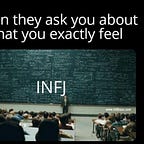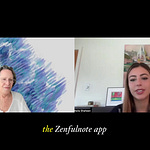I’m an INFJ
(Or, the strange ache of feeling everything all at once.)
There’s something quietly tragic about being the “rarest” personality type. Not because you feel special but because you often wish you didn’t.
I’ve known I was an INFJ since I was a teenager, back when online quizzes felt like horoscopes with better vocabulary. “Introverted, Intuitive, Feeling, Judging”. Those four words that at first felt like a diagnosis. And maybe in some ways, they are. Not of pathology, but of perception. Of being the kind of person who watches the world through glass, hearing everything, feeling everything, but rarely ever being truly seen. The kind of person people turn to when they need depth, clarity, or someone to just sit in the dark with them and not flinch.
But rarely does anyone ask how I’m doing. Maybe it’s because I don’t offer much. I keep things really close. Not out of secrecy, but out of self-preservation. My vulnerability is sacred and silent.
I used to think being highly intuitive meant I was wise.
Now I realize it just means I absorb things before I’m ready. I walk into a room and feel the tension before a word is spoken. I notice the shift in someone’s facial expressions mid-conversation and can feel what they think about me. And spiral my words before they’ve even threaded meaning. I shut down when it’s really time to speak because words don’t do justice to the overlapping kaleidoscope of thoughts and emotions inside (they’re like colors spinning so fast they blur into a dull, unnamable gray). I spend more time than I’d like to admit thinking about purpose. Not in a dramatic, existential way but in a steady, ongoing hum beneath everything I do. I’m always mapping the future, checking in with my inner compass, wondering if I’m aligned or just floating. And I’ve made peace with the fact that my brain is constantly writing subtext, filling in silences with imagination, trying to make mold of the invisible.
As a child tiptoeing into the world, I didn’t always have the words to describe myself. So I clung to the ones others offered. Adults, teachers, and peers would pause when they looked at me, tilting their heads like they were trying to solve a riddle. They’d begin with, “You’re so…” and let the rest fall out like puzzle pieces they couldn’t quite place:
“You’re so thoughtful.”
“You’re so serious.”
“You’re so mysterious.”
“You’re so quiet.”
“You’re so grounding.”
Each phrase became a mirror I tried to understand myself through. Labels meant as compliments, maybe, but also confessions that I didn’t move through the world the way most kids did. I wasn’t loud. I wasn’t simple. I was something else. And even then, I could feel it- how being perceived was different than being known.
INFJs are known for being idealistic, empathic, deeply principled, and... emotionally drained. According to Myers-Briggs theory, we’re driven by a dominant cognitive function called Introverted Intuition (Ni), which translates loosely to: we see patterns where others see dots. We live in the potential of things- how they could be, not necessarily how they are. This makes us dreamers.
This is both our gift and our heartbreak.
Here’s a side note I wish more people knew: the Myers-Briggs personality system was originally created by Isabel Briggs Myers and her mother, Katharine Cook Briggs, who were inspired by the theories of Carl Jung and his work on psychological types. Jung proposed that each person has innate preferences in how they perceive the world and make decisions. The mother-daughter duo expanded on these ideas, developing the MBTI not as a diagnostic tool, but as a way to better understand human differences, especially in the context of work, love, and personal growth.
And that’s what I’ve come to believe this all is: not a label, not a box, but a mirror. One more way to glimpse what’s underneath. One more path into the shadow.
Some takeaways for anyone exploring their type through a shadow work lens:
Your type is not your sole truth. It's your starting point. It shows you your preferences, not your potential.
Introverted Intuition (Ni) tends to ignore the present in favor of the symbolic or possible. That’s powerful, but it can also detach you from what is.
INFJs often over-identify with being “the listener” so shadow work means asking: what part of me is silenced in that role?
Empathy without boundaries becomes self-abandonment. If you’re constantly feeling others, ask: what am I not feeling in myself?
Our deepest wounds often hide in our gifts. For example, the INFJ’s desire to “understand others deeply” can mask a longing to be understood ourselves.
Somewhere between silence and sensitivity is the INFJ shadow. The part that wants to disappear and be noticed at the same time. The part that’s spent a lifetime being tuned in but never quite reflected back.
We don’t do this work to become someone new.
We do it to remember who we’ve always been beneath the noise, roles, and patterns.
🖤 Thanks for reading Shadow Work to Expand Awareness: a space where inner work meets the outer world through shared prompts, writings, and livestream conversations with Dr. Connie Zweig, Ph.D and Keila Shaheen.
Support our work:
– Get the Zenfulnote App to make inner-work part of your daily life
– Keila’s books: The Shadow Work Journal · The Lucky Girl Journal · The 369 Journal · The Book of Shadow Work · The Light Work Journal NEW! pre-order
– Dr. Connie’s books: Meeting the Shadow · Romancing the Shadow · Meeting the Shadow on the Spiritual Path · The Inner Work of Age– Keila’s website: www.keilashaheen.com
Join the Conversation!
Join our Substack community chat for ongoing discussions, Q&As, and shared insights. + find and save a special image of the prompts above so you can save it and share it with others!












